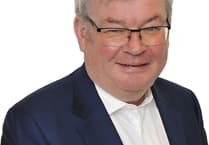THE Lansbury Estate business park, which is home to an eclectic mix of 40 companies, started life as an electrical component manufacturer working out of an old cow shed in St Johns.
Crater Controls, established by Woking-born Arthur Craven and a colleague in 1947, developed from making a range of electrical switches and other components to producing complete goods such as hairdryers and tea-making machines.
Speaking from his office at Lansbury Estate, Arthur, who turns 94 next month, recalled that Crater replaced the old cow shed with a larger building and then needed to move to somewhere even bigger.
He was offered land on the edge of Knaphill on which a multi-storey building was to be put up.
“But I wanted somewhere suitable for flowline production. I walked through some bushes and came upon this site, which was six acres and has just a few derelict buildings on it,” he said.
Arthur got into conversation with a man in an old wooden shed. He was an inmate at Brookwood Mental Hospital and caretaker of the land, which was a former brickworks. Arthur contacted the owners and in 1956 bought the site and built his factory.
At the height of Crater’s fortunes, the company was employing more than 500 people.
Some of the staff were brought in on buses from as far away as Basingstoke. In a move that was very forward-looking at the time, the company provided a crèche for the workers.
Crater moved into the final product business because its customers were having great difficulty in getting their goods manufactured.
“They said ‘Come along, Arthur, you have all the equipment here, why don’t you make them?’”
The small domestic appliances produced from the Knaphill site included up to 10,000 hairdryers a day.
The success came to an abrupt halt one night in 1972 when the first of a set of new heaters caught fire, destroying all the production areas.
There then followed a very difficult eight-year period in which the various lawyers were, in Arthur’s words “at each other’s throats.” The case eventually went to the Old Bailey in a case that lasted a week.
The insurers agreed to pay out on the buildings, but Crater was facing great difficulties. Arthur had started a medical diagnostics equipment company, Medelec Ltd, from his home in Hook Heath. It later moved to St Johns and then to Manor Way in Old Woking.
In 1979, with the legal battle over the factory fire still raging, Arthur sold Medelec Ltd, but despite this and the insurance payout, the future for Crater was grim.
“At the end of 1979, early 1980 I had no choice but to draw stumps,” Arthur recalled sadly.
However, the idea for the current successful business came a few days after Crater folded.
“I went away for a break and when I came back I looked at the buildings and thought they are jolly good buildings and thought there is room for a hell of a lot more, so why don’t we let them to someone else.”
So, Lansbury Estate was born.
I asked Arthur if the name was perhaps related to the great actress Angela Lansbury.
“No, but that will do,” he said. In fact the name was chosen just because it was “nice sounding.”
Arthur’s son Mark, a Lansbury director, explained that by now the Lansbury Estate is home to tenants as diverse as the Woking Hospice warehouse, a producer of precision engineering for McLaren, a software security company, website developers, as well as large companies in the oil industry.
“There is quite a concentration of oil-based designers and engineers in the Woking area,” Mark said.
“They like the location, which suits most of their staff. There are very good transport links and adequate parking on site.”
Mark said that Lansbury Estates carries out all the maintenance on site and has someone who looks after the greenery.
Mark’s brother James and their sisters Kate and Claire also work for Lansbury and during the summer some of their children make it three generations of Cravens working at the company.
Arthur is still working hard as said that “the word ‘retire’ is not in my vocabulary”.
He recalled his first day of work – in 1939 – when at 15 he went into Vickers in Weybridge and suggested that he would make a good apprentice.
He was taken on by a manager called George Edwards, who would later run Vickers and was knighted.
Arthur’s step into running his own company came shortly after the war when one of the Vickers customers reported that they had been unable to buy certain switches.
“I first thought, ‘well we’ll make it here’,” Arthur said. “Then I thought ‘that’s ridiculous, I’ll make it and you can buy it’”.
He came out of that discussion with an order for 30,000 switches and then cast around for somewhere to base his factory.
“I’ve always lived in Woking and it seemed to me that if I was going to start a business it would be rather stupid to start it somewhere else,” Arthur said.




